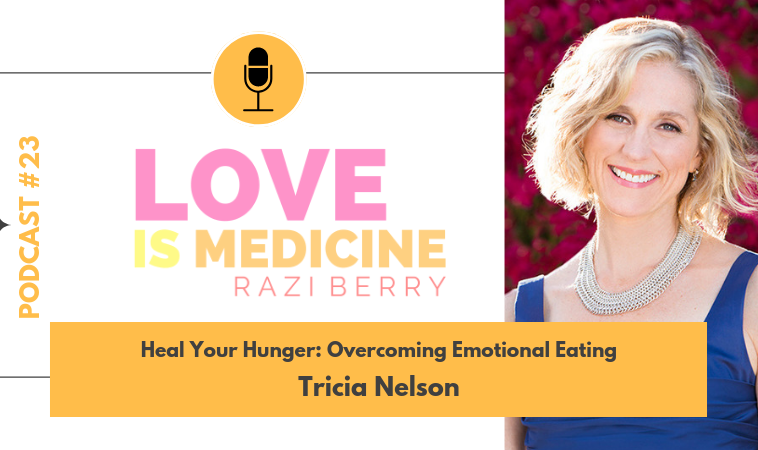Food is an integral part of our society and something that everyone thinks about every day. For some, food can be a conscious or subconscious destructive distraction from your relationship with yourself. Tricia Nelson knows this first hand after losing 50 pounds by identifying and healing the underlying causes of her emotional eating issues. An internationally acclaimed author, speaker, and emotional eating expert, Tricia has helped hundreds of people address and heal the root causes of their eating habits too.
Or, listen on your favorite app: iTunes (Apple Podcasts) | Spotify | Stitcher | TuneIn | Android
Tricia is here today to help you open up about the struggles you have with your body, understand the anatomy and psychology of an emotional eater, and learn how to use your shame to push yourself towards self-care. When you are able to understand where you are on the spectrum of eating obsessions and gain the tools to dismiss the conflict within yourself, you can begin to free yourself from the habits that are not serving you.
While you may not like it at first, Tricia is here to encourage you to ask yourself the hard questions and address your dark side so that you can stop sabotaging yourself with food and start creating healthy boundaries to take care of yourself moving forward. The journey is long, but along the way, Tricia ensures that you will gain a community of support and stop being at war with your body and the world.
If you are ready to start your day with a new perspective, stop the bingeing and start finding comfort in things other than food, Tricia is the perfect guide to help you take your first steps. Its time to dismiss ‘everything in moderation’ and get to the bottom of your relationship with food to build self-esteem and get your body back on track.
Did anything Tricia bring up today relate to your relationship with food and your body? Let us know how you are going to make changes to be kinder to yourself in the comments below.
In This Episode
- The difference between being addicted to food or eating for emotional reasons
- How to stop blaming food as the issue and quit ‘quick-fix’ diets for good
- Honoring your physical cravings and managing addictive substances like sugar
- Examples of personality traits that may cause destructive eating behaviors or patterns
- Steps that you can take to know if you are truly ready to take care of yourself
Quotes
“I didn’t just do it and be done with it. It’s a lifetime journey for sure, this journey is to the soul.” (7:28)
“It’s not an easy thing but I think it really has no bearing on what you actually look like. It has everything to do with what is going on inside. And, as we heal it gets easier and easier to find self-acceptance.” (11:29)
“It’s funny how the awareness can change and then the inner journey begins when we start waking up to what we’re really doing and I think that’s what food gives us the opportunity to do.” (20:09)
“In order to really heal from emotional eating we have to go to dark places, we have to do that inside work that people don’t want to do.” (31:23)
“There are so many life lessons all wrapped up in this whole idea of self-care and really, food is the catalyst for this.” (39:45)
“We get fixated on the item or the thing that we want, but food obsessions are always distractions from our feelings.” (45:32)
Links
Take the Are you an Emotional Eater or a Food Addict Quiz Here
10 Weeks to Freedom from Emotional Eating Program
Heal Your Hunger Book by Tricia Nelson
Follow Tricia on Facebook| Instagram | Twitter | YouTube | LinkedIn
















